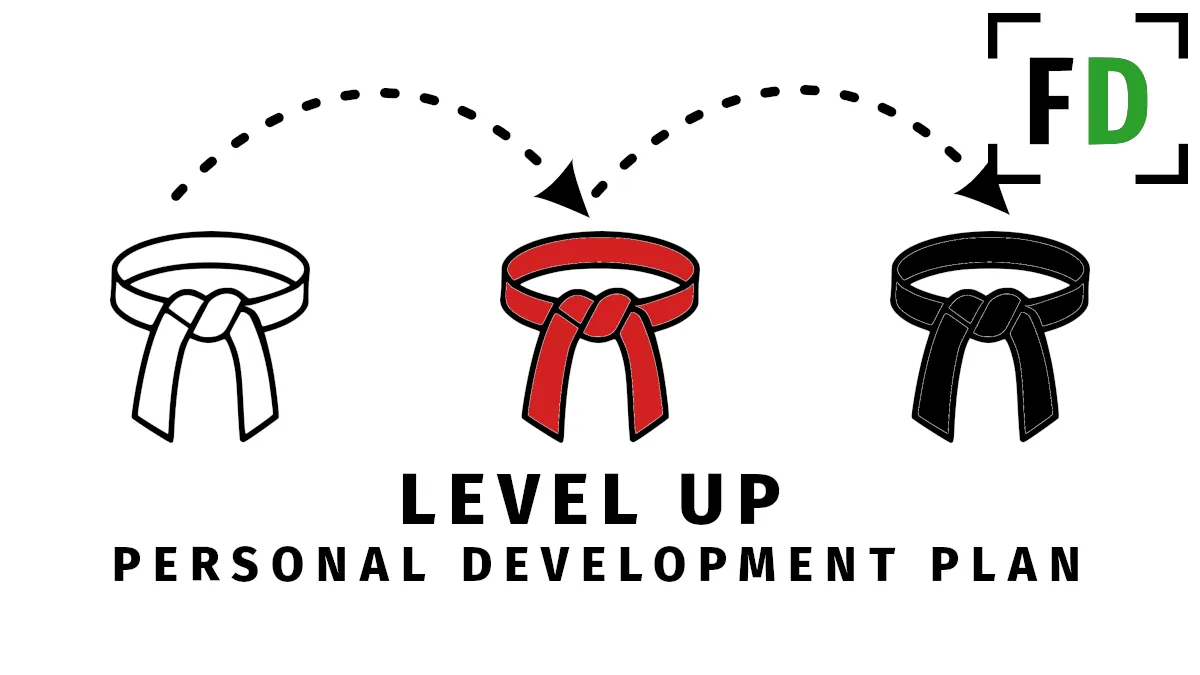You want more money. More time doing things you value. You want to be valued. You want a job that when you tell people their face changes. Changing your life isn’t complicated, but it is a constant struggle against your former self. Face a dragon today and become reborn and you’ll get your life together.
Accept Where You Are
Before making meaningful progress in getting your life together, you must accept where you are. Starting to build on a foundation of half-truths is a surefire way to set yourself up for failure. The truth is that you are where you are right now primarily because of who you are.
If you continue to be the same person, you will continue being where you are. You can’t change who you are if you’re not honest about who that is.
You might start with a personality test or a self-assessment. Both will give you useful information about who you are.
The self-authoring program is also a fine way to dig into your past and how you got to where you are now if you enjoy writing.
If you want to jump straight into this, ask yourself these three questions and write down whatever comes to mind, especially your issues.
- How do you approach work?
- How do you approach other people?
- How do you approach your free time?
Work On Your Issues
You know your issues.
You don’t need a quiz or a therapist to tell you what they are. You know where you’re lacking.
You should have written some down if you completed the previous section.
The reason you need to start where you are rather than where you want to be is that you need to recognize your issues and accept them before you can work on them.
Your issues are what is holding you back from a better life. There is no point in making big goals and big plans if you don’t deal with your issues first else they will ruin your plans and make your goals unachievable.
- Drugs and Alcohol
- Social Anxiety
- Victim Mentality
- Anger Problems
- Disorganized
- Lazy
- Unfit
- Undereducated
- Not well read
- Overly emotional/ overly logical
- Unempathetic
- Undisciplined
- Bad Diet
- Not Getting Enough Sleep
- Insecure
- Overly Competitive
You know what you need to do to deal with your issues. If you’re unfit, you need to work out, you’re undereducated, read more or take classes, anger issues, see an anger management specialist.
You don’t need me or anyone to tell you what you need to do to deal with your issues. It has to be you.
Define the Areas of Your Life
Your life might seem like this huge interconnected web of people and ideas, dreams and disasters but really everyone can simplify their life into about ten categories. If you can manage ten categories you can take complete control of every part of your life.
Each of us has a limited number of areas that make up our lives. Of course, many of these are areas that we all share, such as health, finances, family, etc. But we all also have some areas that are individual to us. For example, painting may be an area of your life, but juggling may be an area of someone else’s.
Most people will be able to think of 7-15 areas that make up the main areas of their lives; try to write yours down. Here are mine:
- Family
- Finance
- Writing
- Exercise
- Homeschooling
- Health
- Martial Arts
- Juggling
- Languages
This list is a high-level view of your life. It’s a good litmus test in itself. If you can’t think of any areas that are individual to you, you probably don’t have enough diversity in your life and need to find new hobbies, habits, or skills to learn.
If your list is over 15 items, you most likely are too scattered in your focus, trying to do too many things and making little progress on them all.
The different areas are also interconnected in ways that aren’t obvious. For instance, when I pay attention to my health (I have a bad back), I can write more(Writing), which earns me more money (Finance) which I can spend on my family.
Young people who want to earn more have this problem; they want to increase their net worth, so they focus solely on their finances, saving the few dollars they have. Instead, they need to expand and learn new skills or encounter new opportunities to increase their finances much more dramatically.
Decide Where You Want to Be
You’ve looked at the past, how you got to where you are, and across the landscape of your current life; now it’s time to look to the future.
Imagine yourself five years from now looking over your list again; what would you want to have true for each area then? Make sure it’s realistic but stretch yourself; how good could your life really be?
Write down your vision of the future for each area of your life.
Some of these visions may not even be that difficult to turn into reality.
- Family – Every week, the family gets together at my house for Sunday dinner.
How difficult is that to make a reality? But that’s what my mind came up with when I thought about the perfect family scenario in my head. It just takes a couple of phone calls, and I could make that come true this weekend!
Not everything is so easy, though. To get your life together, you have to be in a good financial position. So making more money will likely be a concern most people have.
When I was 16, I worked in a supermarket, making less than $5 an hour. So why didn’t I work somewhere I could get paid more? They existed. But I didn’t have the skills or experience to get a better job; all I was worth was $4 an hour.
Though there may be a few exceptions, most people are getting paid what they’re worth; there aren’t many qualified surgeons working at Burger King.
The key to making more money is increasing your worth – you need to learn something new. If you stay the same, you’ll stay the same.
This list of valuable skills to learn and how to learn them is a great starting point; it may not change you overnight, but stick with it, and you’ll become a more valuable person.
Make an Actionable Plan.
Once you have your vision or your goal, you need an actionable plan. Actionable is the crucial word.
What actions will bring about the vision? For each of your visions, you need to ask one question, “What can I do to get that?”
For some visions, you may only need to ask it once, like my family vision above. But if your vision is financial freedom in 5 years, you may need to ask the question a few times.
- Financial freedom in five years
- What can I do to get that?
- Create passive income streams
- What can I do to get that?
- Start a blog
- What can I do to get that?
- Find a guide to “starting a blog.“
By asking this simple question, we turned a vision five years off in the future into an action we can do right now. Finding a guide to start a blog may not seem like getting your life together, but in this example, it’s the first step to building a better life.
Start Working on the Plan
Everything we’ve done so far can seem pretty removed from your day-to-day reality, but you need to work the plan to get your life together.
If all of this still seems unfamiliar and you struggle just researching your first step, that’s OK; taking tiny steps is still moving in the right direction. And though it may seem like you’re not making progress, after a few weeks of doing small tasks and making small changes every day, you’ll start to pick up momentum, tasks will seem more manageable, and you’ll be able to work for longer.
10 minutes every day is all you need to start seeing progress and get better every day. It adds up to 60 hours in a year.
Just do something today.
Tips to Get Your Life Together
Work at it Every Day
“Progress stops when you do.”
Make working towards your goal a daily habit. No weekends, no breaks, no days off. How can we do this without burning out? Simple, do less but do it every day.
I know what you’re thinking because I thought it too. “If I work five days a week, I can work pretty hard, and then after two days off, I feel good enough to do it over again; this way, I’ll make more progress.” And it’s true. But it forgets one thing, over time, your work capacity will increase but only if you tax it.
Just like working out in the gym, your muscles only grow when you tax them.
So find the amount of work you can do every day without burning out and do it. After three months, you’ll notice you’re doing more than before, and after a year, you can do a month’s worth of work in a week without burning out.
Use Time Management Tools
Our lives are too complicated to keep everything in our heads: ten areas, each with different goals and visions and each goal with its own tasks and actions. We need to keep all that stuff outside our heads so we can view it objectively and use our energy for action, not remembering.
Finding the right time management tools for you is worth the time investment. They’ll make you more productive and focused on the things that matter, and that will make a difference.
Create Good Habits
Most of what we do is subconscious. For example, when we wash our hands after going to the bathroom, we don’t decide to do it; it just happens subconsciously because it’s become a habit. What if you could create a habit that happened subconsciously that makes you money? Or that build you valuable skills?
It sounds too good to be true, but it’s very simple to implement. Habits are created by repeated action. Sure, there’s a little more to it than that, but that’s essentially how to make a habit.
When I started Face Dragons, I wasn’t in the habit of writing every day, and for the first few months, I struggled to write two posts each week. It wasn’t until I started writing every day that everything started to feel effortless. Now I wake up, and once the caffeine hits my bloodstream, I’m typing away. I don’t have to try. It’s become a habit.
Choose the Right Hobbies
When you wrote down the areas o your life above (you did that, right?) If you found that you had less than ten, you might want to add a new area of interest to your life; you can do this by finding a new hobby.
A hobby is much less demanding than a goal or a new skill. It’s something you do because you like it and not because you must make progress fast. Hobbies are ways to develop yourself in a way you enjoy and also allow you to let off some steam when the pressure of life starts to build up.
You can find a hobby in lists like this, or you may already have something in mind. But choosing the right hobby can make a huge difference in getting your life together.
A hobby like building computer games might become a valuable experience point for your future career. Or a hobby, cycling could help you achieve your fitness or health goals. You may be able to find a hobby that enables you to achieve your family or social goals.
Of course, I’m not saying your should choose your hobby solely based on what will help you achieve your goals; that’s no fun. But if it can do both at once, it’s a win-win.
Learn the Right Skills
Choosing the right skills will prevent you from needing to go back to square one in the future.
It can be tempting to find the most valuable skill from a list or blog post and decide to learn it so you can go off and make your fortune. But there is more to consider than just how valuable the skill is.
Does it work with your personality?
Sales skills are super valuable. It’s how most companies make their money; without sales skills, marketing, IT, finance, and HR, they’re all useless! But that doesn’t mean you should go out thinking sales skills are something you should learn. If you are introverted, or even an introverted extrovert, a career in sales will be really really tough. Just like a creative type shouldn’t become a scientific researcher.
So the first step to getting your life together is understanding yourself.
Does it also interest you?
Even if you are extroverted, it doesn’t mean a career in sales is for you, sure, you may be good at it, but does it interest you? Could you see yourself doing it for the next 40 years? If the answer is no, you haven’t found the right skill to learn yet, keep looking!
Final Thoughts
I wish I could tell you what you need to do, but what you need to do is figure out what you need to do.
Then go do it.






